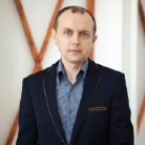
Taras Basyuk
Work place: Department of Information Systems and Networks, Lviv Polytechnic National University, Lviv, 79013, Ukraine
E-mail: taras.m.basyuk@lpnu.ua
Website:
Research Interests:
Biography
Taras Basyuk: candidate of technical sciences, associate professor, associate professor of the Department of Information Systems and Networks of the Institute of Computer Sciences and Information Technologies of the Lviv Polytechnic National University. Author of more than 200 scientific works. Field of scientific interests: development of intelligent decision support systems, hardware and software of multimedia information systems, distributed information systems and technologies, web systems and Internet technologies, ontological engineering systems.
Author Articles
Modeling and Development of a Computer Simulator with the Formation of Working Scenarios for Training Operator Personnel in the Search for Objects
By Taras Basyuk Andrii Vasyliuk Yuriy Ushenko Dmytro Uhryn Zhengbing Hu Mariia Talakh
DOI: https://doi.org/10.5815/ijmecs.2024.04.07, Pub. Date: 8 Aug. 2024
The article is dedicated to solving the problem of modeling and developing a computer simulator with the creation of working scenarios for training operating personnel in object detection. The analysis of the features of human operator activity is carried out, the model of his behavior is described, and it is shown that for the presented task, the following three levels must be taken into account: behavior based on abilities (skills), behavior based on rules, behavior based on knowledge. User models that are used in man-machine systems were created, and their use in the process of modeling operator activity from the point of view of regular and irregular exposure was shown. This made it possible to create a prototype of a graphical window using a user-friendly interface. A system model of human-machine interface for processing and recognition of visual information is mathematically described and a model of image representation based on three possible scenarios of their formation is formed. The result of the study was the software implementation of an effective educational tool prototype that accurately replicates real-world conditions for the formation of working scenarios. The conducted experimental research showed the possibility of general image recognition tests, selection of different test modes, and support for arbitrary sets of image test tasks. Further research will be aimed at expanding the
functionality of the created prototype, developing additional modules, automatically generating scenarios and verifying work.
Other Articles
Subscribe to receive issue release notifications and newsletters from MECS Press journals